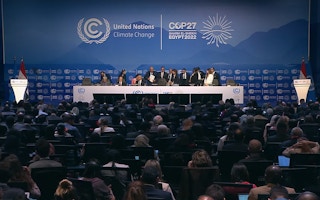“Funding arrangements responding to loss and damage” has been included for the first time in an agenda agreed upon by the global community for the COP27 climate conference that started in Sharm el-Sheikh, Egypt, on November 6.
To continue reading, subscribe to Eco‑Business.
There's something for everyone. We offer a range of subscription plans.
- Access our stories and receive our Insights Weekly newsletter with the free EB Member plan.
- Unlock unlimited access to our content and archive with EB Circle.
- Publish your content with EB Premium.
Countries will have to reach a conclusive decision on the topic by 2024, including the amount and format.
Loss and damage reparations centre around the idea that poorer countries should receive help in recovering from disastrous climate events that they have played little part in causing.
Paying for loss and damage has been one of the most contentious issues in the lead up to the summit. Climate negotiators fought over including it in the agenda until the early hours of Sunday (6 November), before the finalised agenda was released near mid-day.
Loss and damage did feature in past climate conferences, but discussions were centred around technicalities, not money matters.
The United States and the European Union had opposed loss and damage funding at COP26, the last iteration of the annual summit. Devastating weather events such as record floods and droughts in developing Asia this year have fuelled calls for compensation. Egypt, as the COP27 host, has also been pushing for countries to agree to speak about such arrangements.
Sameh Shoukry, Egypt’s foreign minister and COP27 president, said that a conclusive decision on the topic should be reached by 2024. It would be “highly unproductive” to speculate on the outcome of negotiations, such as funding amount and format, he said at a press conference.
“I hope that parties continue in the spirit of finding common areas to agree on, to start outlining what the way forward for loss and damage can be in a time-bound manner,” said Simon Stiell, executive secretary of the United Nations Framework Convention on Climate Change.
The 2024 deadline should not be used for further delays in settling loss and damage arrangements, warned Ines Benomar, a researcher at UK-based think tank E3G. “It is crucial that parties engage in meaningful discussions at COP27 to ensure the highest-ambition outcome for loss and damage financing,” she said.
Debra Sungi, the lead climate negotiator of Papua New Guinea, said that having loss and damage funding in the COP27 agenda is “very pleasing”. Papua New Guinea, as part of an alliance of small island states, has been pushing for a dedicated loss and damage fund, against past discussions that merged the issue with other financing needs.
“This is an African COP, so we would expect the presidency to work together with small island developing countries to ensure that we [surface] our priorities,” Sungi said. Africa and small island states are considered among regions hardest hit by the impacts of a warming world.
“We should cross our fingers. This is the most demanded agenda this time [at COP27]. So we are hopeful that there will be some good news,” said Hafiz Jawad Sohail, a climate activist from Pakistan attending COP27.
Loss and damage funding would be “most important” for his country, he said. The mid-year floods in Pakistan killed over 1,700 people, displaced millions more, and set the country back by over US$46 billion. “But let us see what comes out of the negotiations,” Sohail said, adding that developing countries should also have “solid” plans on how to best use loss and damage funds, if they are disbursed.
The finalised COP27 agenda also included items on long-term climate finance and the transfer of climate technologies to developing nations.
The climate summit takes place as Russia’s invasion of Ukraine continues, threatening the world with energy and food shortages. With Europe seeking more fossil fuels, including natural gas from Africa, to guard against a cold winter, and the United States increasing natural gas production, climate backsliding has become a concern.
Countries should not refer to the current situation “as justification to take the easy road of backtracking, supposedly on the premise that there are other priorities”, Shoukry said.
Over 100 world leaders are expected to deliver national statements on climate change in the next two days, to set the tone for subsequent negotiations.














